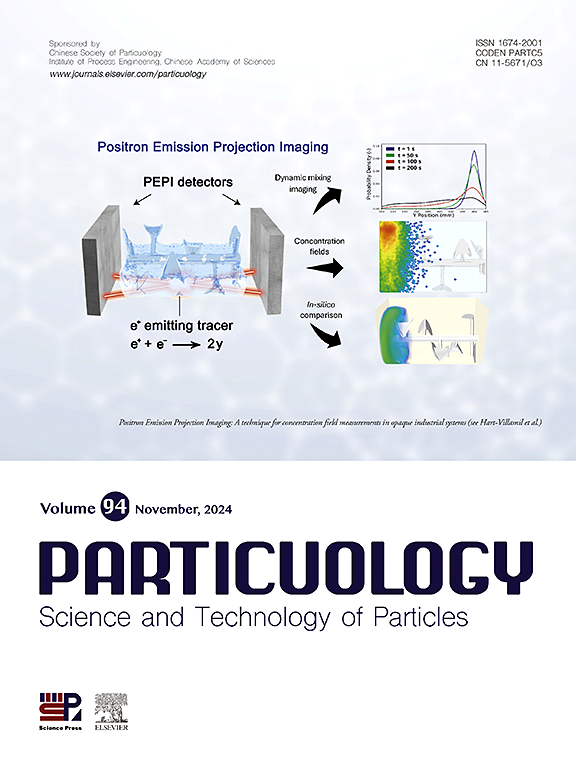Strength and friction dependency of the stress Lode angle in true triaxial configurations: A discrete element perspective
IF 4.1
2区 材料科学
Q2 ENGINEERING, CHEMICAL
引用次数: 0
Abstract
This article investigates the strength and frictional dependence on the stress Lode angle in drained true triaxial configurations using the discrete element method (DEM). A clump logic based on the multi-sphere (MS) approach within the commercial DEM software, particle flow code (PFC3D), was employed to simulate realistic particle shapes. The simulation results indicate that deviatoric stress initially exhibits strain hardening, followed by softening, while pure dilation occurs from the onset of shear. The evolutions of deviatoric stress and volumetric strains are found to be independent of both mean effective stress and intermediate stress ratios (b). The mobilized peak friction angle initially increases up to a certain value of b, then decreases with a further increase in b. The mechanical coordination number (MCN) and sliding contact fractions (SCF) remain unique and independent of b values. Moreover, the critical state friction angle has a significant influence on the stress ratios at the stress Lode angle when compared to .

真三轴结构中应力载荷角的强度和摩擦依赖性:一个离散元的视角
本文使用离散元素法(DEM)研究了排水真三轴配置中应力洛德角对强度和摩擦力的依赖性。在商业 DEM 软件粒子流代码(PFC3D)中采用了基于多球(MS)方法的团块逻辑来模拟真实的粒子形状。模拟结果表明,偏离应力最初表现为应变硬化,随后是软化,而纯粹的扩张则发生在剪切开始时。偏离应力和体积应变的演变与平均有效应力和中间应力比 (b) 无关。机械配合数(MCN)和滑动接触分数(SCF)保持唯一且与 b 值无关。此外,与 θ=-30° 相比,临界状态摩擦角对应力洛德角 θ=+30° 时的应力比有显著影响。
本文章由计算机程序翻译,如有差异,请以英文原文为准。
求助全文
约1分钟内获得全文
求助全文
来源期刊

Particuology
工程技术-材料科学:综合
CiteScore
6.70
自引率
2.90%
发文量
1730
审稿时长
32 days
期刊介绍:
The word ‘particuology’ was coined to parallel the discipline for the science and technology of particles.
Particuology is an interdisciplinary journal that publishes frontier research articles and critical reviews on the discovery, formulation and engineering of particulate materials, processes and systems. It especially welcomes contributions utilising advanced theoretical, modelling and measurement methods to enable the discovery and creation of new particulate materials, and the manufacturing of functional particulate-based products, such as sensors.
Papers are handled by Thematic Editors who oversee contributions from specific subject fields. These fields are classified into: Particle Synthesis and Modification; Particle Characterization and Measurement; Granular Systems and Bulk Solids Technology; Fluidization and Particle-Fluid Systems; Aerosols; and Applications of Particle Technology.
Key topics concerning the creation and processing of particulates include:
-Modelling and simulation of particle formation, collective behaviour of particles and systems for particle production over a broad spectrum of length scales
-Mining of experimental data for particle synthesis and surface properties to facilitate the creation of new materials and processes
-Particle design and preparation including controlled response and sensing functionalities in formation, delivery systems and biological systems, etc.
-Experimental and computational methods for visualization and analysis of particulate system.
These topics are broadly relevant to the production of materials, pharmaceuticals and food, and to the conversion of energy resources to fuels and protection of the environment.
 求助内容:
求助内容: 应助结果提醒方式:
应助结果提醒方式:


